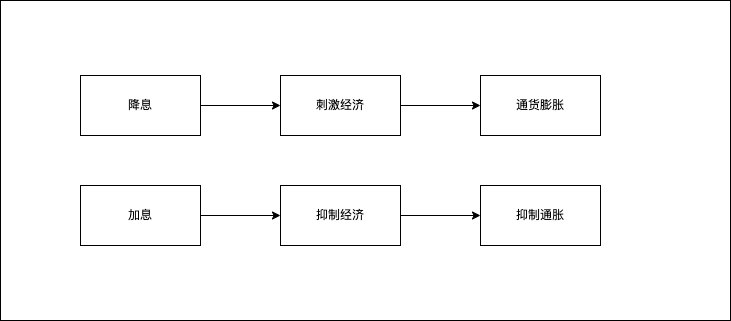Original link: https://blog.forecho.com/things-you-should-know-about-interest-rates.html
introduction
Friends who follow US stocks must be familiar with the “Federal Reserve raising interest rates” this year, right? In order to ease the high inflation in the United States, the Federal Reserve has raised interest rates several times this year. What does raising interest rates have to do with interest rates? What does it have to do with US stocks? In this article I try to explain it.
What is an interest rate?
Interest rate, also known as interest, is simply the time cost of money. For example, suppose the bank’s interest rate is 3%, then you deposit 100 in the bank, then the money you withdraw next year is 103. Similarly, if you borrow 100 from the bank, then the money you return to the bank next year will be 103.
Why are interest rates so important?

rate cut
Let’s assume that if the bank sets the interest rate to 0%, the cost for everyone to borrow money from the bank is 0, then what will happen?
- People with money in hand: There is no interest in the bank, so it will definitely not be saved. Might as well spend the money. This leads to less saving and more consumption and investment
- People who are short of money: borrowing money from a bank does not require interest, so it must be borrowed. Companies can also seek bank loans to expand their scale.
To sum up, low interest rates lead to more borrowing, more consumption, and more investment. To stimulate the economy, low interest rates make the economy more active.
PS: Ray Dalio of Bridgewater Fund shared a 30-minute video called “How the Economic Machine Works” after the US financial crisis in 2008, introducing the production effect, the short-term debt cycle, and the origin of the long-term debt cycle. I haven’t seen it. My friends strongly recommend to visit.
In 2020, the Fed was just about to raise interest rates, but because of the epidemic, it had to cut interest rates to stimulate the economy. The interest rate of domestic deposits is generally around 2-4%, but in fact, in order to stimulate consumption in countries such as Europe and Japan, interest rates have always been low, and they are almost close to 0%.
rate hike
Since there are so many benefits of cutting interest rates, why not cut them all the time? Things are certainly not as simple as you think, cutting interest rates is good, but it will lead to inflation.
The cut in interest rates has led to more and more wealthy people and stronger demand, which will lead to rising prices of raw materials, as well as various things and wages will naturally follow. This is called inflation.
In order to reduce inflation, the central bank can only choose to raise interest rates, which will curb the economy in the short term and inflation in the long term.
interest rate
risk free rate
The interest rate we usually discuss is the risk-free interest rate, which refers to the interest rate without risk, and the cost of borrowing money for people who can definitely pay back the money. The closest thing to a risk-free rate is bonds issued by governments, large corporations (Tencent, Apple, etc.).
The prices of the 10-year U.S. bond yield and the 2-year U.S. bond yield that we often hear are closely related to the risk-free interest rate.
overnight rate
The so-called rate hike by the Fed means that at the close of business every night, the government adds a point to the interest rate, which is the overnight rate.
In general, the central bank can control short-term interest rates, while long-term interest rates are determined by the market.
Impact of interest rates
inflation
I have said it before, and now I will summarize it again. The low interest rate will stimulate the economy, but it will lead to inflation. Raising interest rates will suppress inflation, but it will also suppress the economy.
bond
The bond price and interest rate are published by a calculation, and their relationship is:
- Interest rates rise, bond prices fall
- Interest rates fall, bond prices rise
When interest rates rise, the government will issue bonds with higher interest rates, and fewer people will buy bonds previously issued, and the price will fall.
stock
Rising interest rates directly lead to higher costs for companies to seek bank loans, increase financing costs, and hinder the development of companies, especially those growth stocks that are not yet profitable, may face the risk of bankruptcy or acquisition.
For individuals, the loan cost to buy a house and a car has also increased, so the demand has also decreased, which has also made it more difficult for the company to make money, which is also negative. A look back at ARKK’s holdings shows that. Many stocks such as UPST fell 10 times. NFLX is the first to experience negative user growth. But for the necessities of life such as KO and MCD, the blow is relatively small.
Raising interest rates will also reduce the liquidity of stocks. The lower the liquidity of stocks, the lower the amount of capital in the stock market, which will lead to a decline in stock prices.
real estate
- Rising interest rates lead to a drop in demand for housing, which is bad for house prices
- But inflation will lead to more people buying houses to resist inflation, which is good for house prices
So is gold.
Banking/Insurance
Interest rates have risen, which is good for the banking and insurance industries.
Summarize
Interest rate is a seemingly inconspicuous thing, but it is closely related to our lives. Whether you have invested in stocks or not, you should understand the impact of interest rates on our lives.
This article is reprinted from: https://blog.forecho.com/things-you-should-know-about-interest-rates.html
This site is for inclusion only, and the copyright belongs to the original author.